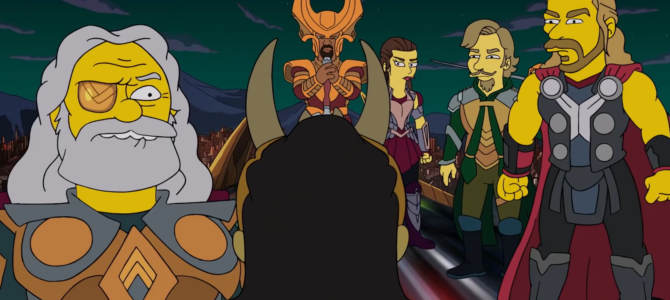“This is what happens when Disney buys Marvel and Fox,” read a painted sign held by Arnold Schwarzenegger parody Rainier Wolfcastle in the Disney Plus animated short “The Good, The Bart, and the Loki.”
If you couldn’t guess, the July 7 feature was a crossover event between Marvel Studios and The Simpsons, both subsidiary properties of the Disney Company. The six-minute animated feature was created to promote the new “Loki” series on the Disney Plus streaming service, and that’s exactly how it feels.
Springfield, your savior has arrived. Start streaming the short, @TheSimpsons: The Good, the Bart, and the #Loki now on #DisneyPlus. pic.twitter.com/vLIHUXEq91
— Disney+ (@disneyplus) July 7, 2021
Like any other multimillion-dollar corporate ad, it is soulless and vapid.
Historically, very little has been off-limits for “The Simpsons’” showrunners. Part of what made the show special was its willingness to take risks. Much like Bart, the show relished in openly mocking the established order and thumbing its nose at anything that demanded respect. In the show’s seventh season, Homer even fistfights President George H.W. Bush.
“The Simpsons” even lampooned the numerous departments of Fox Studios and Disney in the show’s pre-woke days.
The classic Simpsons wit that enabled the series to last 34 seasons without breaking a sweat, however, was nowhere to be found throughout the short. The most daring quip cracked throughout the corporatist concoction was when Ralph Wiggum, as the Incredible Hulk, said he “ruined [his] pants in a brand new way.”
It might elicit a wry chuckle when the morbidly obese Comic Book Guy appears as the speedster Quick Silver when the Springfield Avengers come to give Loki his comeuppance, or maybe a groan of morbid humor when Homer asks Loki to turn Ned Flanders into a pork chop so he can subsequently cannibalize his pious neighbor. But that’s pretty much it.
In 2009, The Walt Disney Company purchased Marvel Entertainment for $4 billion. In 2019, they acquired 21st Century Fox for $71.3 billion. With these acquisitions, Disney became the owner of some of the most lucrative and beloved intellectual property across the globe.
Following Disney’s 2012 purchase of Star Wars’ parent company Lucasfilms for $4 billion, Disney Plus premiered “The Force Awakens From Its Nap” earlier this year. It’s similar in concept to “The Good, The Bart, and The Loki” but it is actually enjoyable.
In brief, instead of dropping off her perennial toddler at The Ayn Rand School For Tots, Marge Simpson drops Maggie at Jabba’s Hut Jedi Preschool. Here a Jedi cafeteria worker makes PB&J sandwiches, naughty children take their timeouts by being frozen in carbonite, and R2-D2 earns his keep as a diaper genie.
There is not a single line of dialogue in this short, which adds to its charm. The viewer’s attention is drawn towards the numerous visual gags. In classic Star Wars fashion, the music contributes to the viewing experience, and the short’s climactic pacifier-lightsaber duel pokes fun at the inner fan in all of us that demands to see a Jedi battle in anything remotely affiliated with George Lucas.
On the other hand, “The Good, The Bart, and The Loki” delivers all of the fanservice — saturating the viewer in intellectual property — with none of the self-awareness that made “The Simpsons” so popular. It’s as though Disney is simply assessing what intellectual property they can blend to best generate self-promoting content on their streaming service. It’s the cartoon equivalent to the empty calories from a candy bar.
Fox recently finished airing season 32 of “The Simpsons” to reviews that were mixed at best.
For a while now, Disney’s corporatism has grown increasingly cynical. In the credits of the 2020 live-action “Mulan,” Disney thanked security agencies of the Chinese Communist Party in the Xinjiang region connected to the ongoing ethnic cleansing of the Uighur Muslims. They have also allegedly been holding extensive critical race theory training for their employees.
As China’s share of the global entertainment market grows, so does Disney’s willingness to bend the knee to appease them. It’s painfully obvious Disney is more concerned with maintaining an agenda than the artistic integrity of their intellectual property.
“The Good, The Bart, and The Loki,” is characteristic of this cynical, pandering shift. It is an insult to the legacy of American satire.









